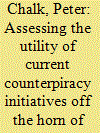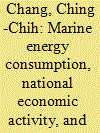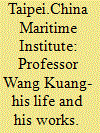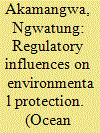| Srl | Item |
| 1 |
ID:
114834


|
|
|
|
|
| Publication |
2012.
|
| Summary/Abstract |
This article examines the current international response to piracy and armed robbery off the Horn of Africa (HoA). It first describes the measures that are presently in place before going on to assess the relevance of these responses, both in terms of serving as a viable deterrent and in the context of addressing the root causes driving armed maritime crime in this part of the world. The article concludes by offering some tentative recommendations on how best to improve the regime of antipiracy in the HoA, focusing on capacity-building, the development of sub-regional maritime security arrangements, incentives to better engage the shipping industry in mitigation efforts and micro socioeconomic development projects in coastal regions of Somalia that support piracy.
|
|
|
|
|
|
|
|
|
|
|
|
|
|
|
|
| 2 |
ID:
133677


|
|
|
|
|
| Publication |
2014.
|
| Summary/Abstract |
Growing concerns about the slow revival of the world economy, volatility in oil prices, overcapacity in shipping and fierce competition is denting profits in the shipping industry. On the other hand, emergence of greenhouse gas emissions and pollution control regimes at sea is forcing ship owners to make expensive technical modifications onboard ships, which are further driving up the costs of operations. In such a rapidly changing scenario, there is a need for a long-term vision for transitioning to an era of sustainability in the international shipping industry. The paper commences with a discussion on the concept of sustainability as applicable to the shipping industry and highlights the recent developments in the maritime domain, which pose significant environmental and economic challenges for the shipping industry. It identifies the emerging trends in the shipping industry and argues that these challenges also present a window of opportunity for the industry, for undertaking a paradigm shift towards sustainable shipping. It further explores the transition pathways and presents various options that can be implemented in the shipping industry, which will aid its transition towards sustainability. Using a case study, the paper highlights the key characteristics of sustainable shipping and briefly discusses the Indian maritime scene before concluding that the adaptability of the world shipping industry to adopt the practices of sustainability is fundamental to its survivability in forthcoming decades.
|
|
|
|
|
|
|
|
|
|
|
|
|
|
|
|
| 3 |
ID:
101264


|
|
|
| 4 |
ID:
111390


|
|
|
|
|
| Publication |
2012.
|
| Summary/Abstract |
The causal relationships among marine energy consumption, greenhouse gas emissions from international shipping, and economic growth for Kyoto Protocol Annex I countries for the period of 1990 to 2006 are discussed. The real gross domestic product is used as a proxy for economic activity. The United States is also discussed because it was the main global polluter before 2006. The co-integration methodology and an error-correction model are used to examine the causal relationships. The empirical results show that marine energy consumption and GDP are the main factors of increased GHG emissions in the short-run, and that economic activity significantly increased emissions in the long-run. Emissions from shipping are more closely related to marine energy consumption than to economic activity. Hence, policies for mitigating greenhouse gas emissions from marine shipping need to focus on greater energy efficiency in the design of ship engines and hulls.
|
|
|
|
|
|
|
|
|
|
|
|
|
|
|
|
| 5 |
ID:
038747


|
|
|
|
|
| Publication |
Taipei, China Maritime Institute, 1972.
|
| Description |
280p.Hbk
|
|
|
|
|
|
|
|
|
|
|
|
Copies: C:1/I:0,R:0,Q:0
Circulation
| Accession# | Call# | Current Location | Status | Policy | Location |
| 014232 | 926.29045/CHI 014232 | Main | On Shelf | General | |
|
|
|
|
| 6 |
ID:
152771


|
|
|
|
|
| Summary/Abstract |
This article reports the findings of an empirical study on the regulation of ship-source pollution at one United Kingdom-based global ship management company. In examining the corporate response of the case-study company, particular attention is given to the regulatory influences promoting such compliance as expressed in the views of company executives. The findings show that both legal regulatory pressures and customer demands are important factors in encouraging the company to comply with environmental requirements. However, the study also revealed that compliance with environmental requirements ultimately depends on the way in which individual companies adapt to different national regulatory and enforcement regimes.
|
|
|
|
|
|
|
|
|
|
|
|
|
|
|
|